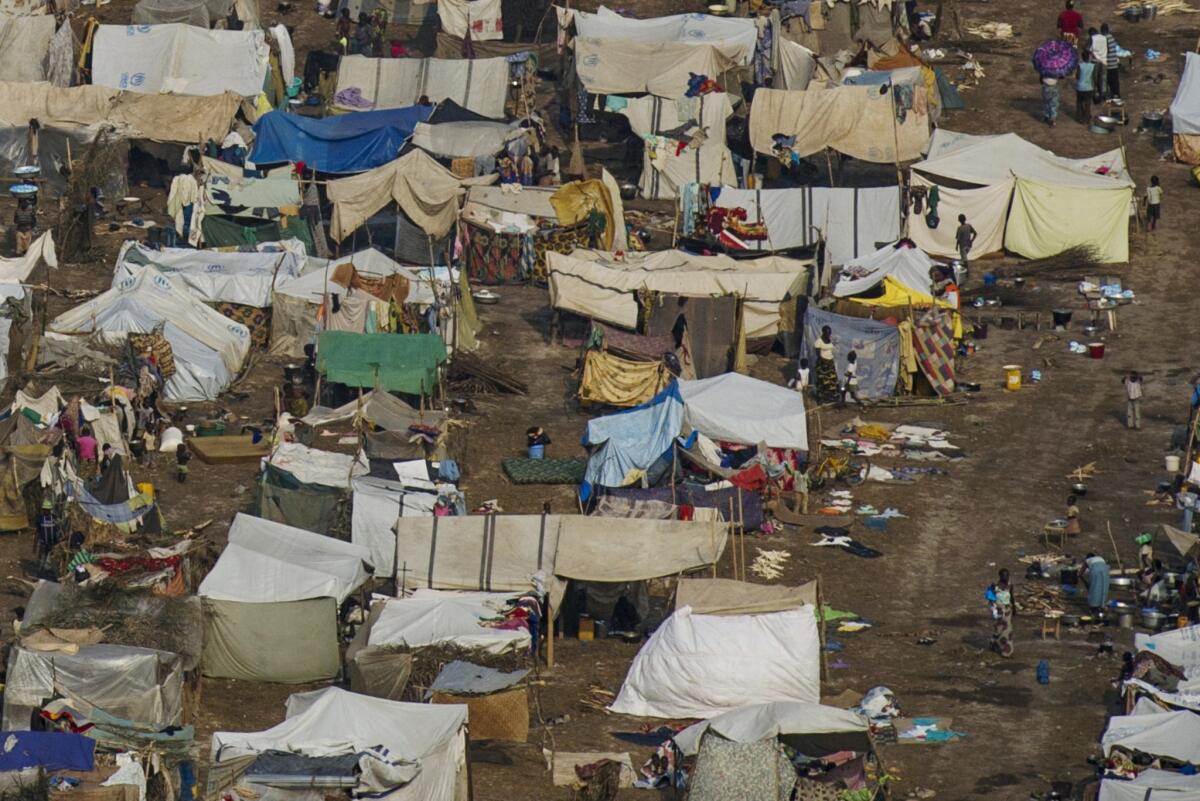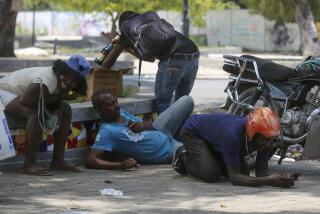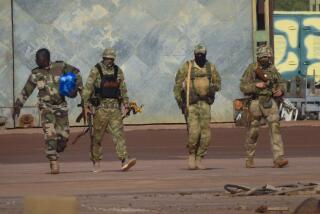Civilians massacred amid sectarian chaos in Central African Republic

JOHANNESBURG, South Africa -- The men came to the village in the Central African Republic at dawn, armed with Kalashnikovs, machetes and knives. A 55-year-old father of 10 hid in tall grass and watched in horror as the attackers handed his children and a grandchild to one of their own.
One by one, he cut the childrens’ throats and tossed them to the ground.
“After the children, they killed my wives, and then more people, people they had caught in the neighborhood,” the man from Bodora said as he recounted the Sept. 6 attack to Human Rights Watch interviewers. “There were bodies everywhere. They left them there.”
The massacre in Bodora and other attacks are detailed in a Human Rights Watch report released Thursday, “They Came to Kill,” which documents more than 157 slayings of civilians as sectarian violence has swept through the country in recent months. The man in Bodora is Muslim, but Christian communities have been targeted as well.
On Nov. 18, the report says, seven Christian farmers were caught by a militia, trussed up and taken to the fighters’ commander, who said, “Throw them in the river.” Two were tied up and thrown into shallow water while others were taken to a bridge over the river, tied up, beaten, slammed into the concrete bridge, then tossed into the water.
“They began to beat me on the head and body with their rifle butts, and my whole face was bloody,” said one of the three survivors. “They had no more rope, so they tied me up with my pants and threw me into the river.
“They first threw me down on the cement floor and then rolled me into the river,” he said. “I rose to the surface and could see they were following me with their rifles. I went under three times and then my pants came loose and I managed to swim to the shore.”
The current turmoil began when mainly Muslim Seleka rebels from the country’s northeast ousted President Francois Bozize in March and installed Michel Djotodia in his place. Djotodia is the first Islamic leader in the Central African Republic, where 80% of the nation’s nearly 5 million people are Christians and 15% Muslims.
Djotodia disbanded Seleka in September, integrating his rebels into the army. However, bands of former Seleka fighters continued to mount attacks on Christian villages in the north. Christian militias, known as the anti-balaka -- meaning anti-machete -- sprang up in recent months and unleashed revenge attacks against Muslims.
The country has seen coups, instability and violence since independence from France in 1960, and remains mired in poverty despite its rich mineral resources. Numerous militias range across the country, many of which routinely recruit children to fight.
The death toll in the recent violence is not known, Human Rights Watch reported, because many areas are too isolated to reach. But Amnesty International reported Wednesday that violence in the capital, Bangui, on Dec. 5-6 saw anti-balaka forces go from house to house and kill about 60 Muslim men. Former Seleka fighters retaliated by massacring about 1,000 people in the two-day period, according to Amnesty International.
The Amnesty International report said that despite the presence of French and African troops who are deployed to protect civilians, people were being killed daily, often shot or slashed with machetes or stoned by mobs. At least 90 people had been killed since Dec. 8, the report said.
Both Amnesty International and Human Rights Watch reported widespread crimes against humanity and called for the deployment of more international peacekeepers to protect civilians. United Nations Secretary-General Ban Ki-moon has recommended the deployment of 6,000 to 9,000 peacekeepers.
An African-led support mission is to be expanded to 6,000 troops by year’s end, while 1,600 French troops have been deployed. Amnesty International said that although the French and African forces had not stopped the violence, they may have prevented more widespread atrocities.
Samantha Power, the U.S. ambassador to the U.N., flew into Bangui on Thursday for meetings with Djotodia and leaders from the Christian and Muslim communities, in an effort to prevent the country from sliding further into sectarian war.
Power said the U.S. would provide military liaison support to assist African peacekeepers as well as an extra $15 million in humanitarian assistance, Reuters news service reported.
One complication in peace efforts is that the anti-balaka forces tend to be scattered local fighters without a central command. Some, however, are heavily armed former members of the military who are loyal to Bozize.
The Human Rights Watch report focused on violence outside the capital in the north.
“Many of the attacks involved shocking brutality: one Muslim woman, a nomadic cattle herder, told Human Rights Watch that she was forced to watch as anti-balaka fighters cut the throats of her 3-year-old son, two other boys ages 10 and 14, and an adult relative -- all the Muslim males in the cattle camp,” the report said. “Some of the survivors reported hearing anti-balaka fighters say they intended to kill ‘all the Muslims.’”
Describing the incident, a 32-year-old woman from a cattle herding family outside Bossangoa said anti-balaka forces attacked the camp in large numbers on Sept. 5.
“They put us on the ground, and then said they would kill the males only. They told us to remove our shoes. There were a lot of them and then they pushed the four males down and cut their throats in front of us.
“One was my husband, Yaya Douka. The others were just children: Bouba Keriyo, 14, Tahirou Keriyo, 10, and Khalidou Ngadjo, 3. Even the children had their throats cut. My daughter Habiba, 3, was hit on her head with a machete and cut all over her back with knives. She was in her father’s hands so they thought she was a boy,” she said.
Farmers were shot down in their fields or stabbed in their houses by the Muslim attackers who were formerly from Seleka, the report said. Cattle herders were attacked, massacred and had their cattle stolen by Christian anti-balaka.
More than 450,000 people have fled their houses, and are sheltering in the bush. Hundreds of villages have been burned to the ground.
A 32-year-old nurse from the village of Ndjo said he was trying to tend medical cases among those in hiding, but all he had was the medical kit he grabbed from his clinic before he fled. Ex-Seleka rebels had looted all the clinic’s medicines. Inside the kit was a single bandage and a few medical tools.
He said many people living in the bush had died of malaria, including his sister, Delphine Yamini, 37.
“My sister died just 48 hours ago,” he said. “She had a bad case of malaria, and anemia. There was nothing I could do.
“We live and die like animals here.”
Twitter: @latimesdixon
More to Read
Start your day right
Sign up for Essential California for news, features and recommendations from the L.A. Times and beyond in your inbox six days a week.
You may occasionally receive promotional content from the Los Angeles Times.






